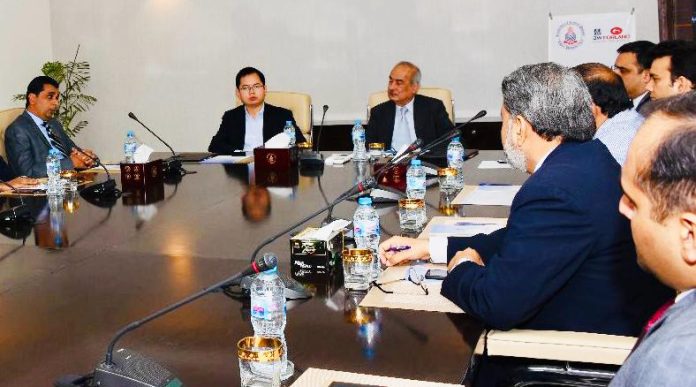Pakistan’s automotive industry is a significant contributor to the country’s economy in its GDP. However, to sustain growth and competitiveness, it is crucial to foster a strong linkage between the industry and academia.
Benefits of Industry-Academia Linkage:
- Innovation and Research: Collaboration between industry and academia drives innovation, leading to the development of new technologies and products.
- Skilled Workforce: Academia can provide the industry with a skilled and knowledgeable workforce, reducing the need for costly training.
- Curriculum Development: Industry input helps academia develop relevant curricula, ensuring graduates meet industry needs.
- Entrepreneurship: Collaboration can lead to the creation of new startups and businesses, driving economic growth.
- Sustainability: Joint research and development can focus on sustainable practices, reducing environmental impact.
Challenges and Opportunities:
- Gap between Industry Needs and Academic Curriculum
- Limited Research Funding
- Lack of Collaboration and Communication
To address these challenges, initiatives like: - Industry-Academia Partnerships
- Research Grants and Funding
- Regular Industry-Academia Forumscan be established
Way Forward Strategy:
Coordinated linkage between industry and academia is the critical bridge in solving business related production, technology, and management problems.
This initiative may include; identification of priority sectors for carrying out industry academia linkages projects for any research that can be commercialized and has a significant economic impact, or for such business improvement projects that can be replicated across a number of firms and industries.
Capacity of the Offices of Research, Innovation and Commercialization (ORICs) under HEC can be further developed and provide financial support for research commercialization and business improvement projects.
Development in the fields of Information Communications Technology (ICT) are indeed revolutionary in nature; Information and knowledge are expanding in quantity and accessibility. ICT contributes directly to spread fruits of sustainable development and reduce traditional geographical barriers, providing an opportunity for all to access local and global markets in a more equitable manner.
Industry-Academia Linkage (IAL) can be defined as the goals and objectives of interaction and collaboration between industry and academia. The backbone of academia is innovation, philosophy, and theory, but industry depends on broad, commercially viable ideas for its survival. Instead, the university is a computer, and the industry is a tool.
To better understand this gap, think of a professor who gives thousands of lectures on swimming but does not get in the water until he retires, and he remains closed and unfinished. Then there is the issue of supply and demand gap between industry and academia. Curriculums were written decades ago, but the industry is advancing every day. In today’s world, the market conditions and the speed of the industry are faster than ever. That is why a ‘machine’ enters the factory floor; he knew right away that he didn’t know for sure…the paper was out of the syllabus…! The second half of the learning journey comes from the psychological impact on machines.
Industry-Academic Links (IAL) are ideal for business organizations, academic institutions, and even countries. Without following this concept, Industrial Revolution is not possible. In conducting applied research, this interaction must be reciprocal. Distributing projects among students is another problem. It’s like four people living together in a four-bed house but not knowing which of them is sleeping. Engineers have to study for 18 hours to enter an accredited university, but after entering an accredited university, they don’t suffer like medical students and accounting students. The laboratories in most of the technical institutions are old, unprepared and incomplete. There are no shops in universities, but medical schools have training centers.
Pakistan is no different from other South Asian countries in facing the negative effects of this inequality. There is still a gap between technology and curriculum, especially in the Third World. Last year, Pakistan was ranked 88th among 132 countries in the 2023 Global Innovation Index.
Pakistan’s human resource index ranking 164 out of 193 countries is a source of ridicule for us. Therefore, foreign organizations are interested in students who want to be accepted to support education in the country they are visiting. Pakistan, like other South Asian countries, is lagging behind in developing quality products and exporting them to the world due to lack of research and development. In Pakistan, only 60% of the 200 public and private universities accredited by HEC cooperate with private sector organizations and public institutions. Unfortunately, most of this 60% is only on paper or thrown away.
Funding cuts are the biggest reason. In contrast, public universities have no money to spend; Private universities need funding. Low budgets are allocated to research and development, which is scarce in an age where day-to-day management is outdated. In R&D, we rank at 113th out of 132 projects. Because it is strongly related to economic growth, without a land base, the hope for self-fulfillment and research and development is like a fantasy.
Basically, we are a nation that likes to take chances, take shortcuts, and quickly pursue degrees, whether or not we want them. Students say that education is responsible and exhausting. The curriculum needs to be changed. Links between academia and industry should be strengthened. HEC has to play a role in making certain things official. Public awareness should be raised through many activities.
Industry
Responsibilities
- Supervise academic projects
- Provide corporate trainings
- Support & finance initiatives
- Resource sharing
- Curriculum advisory
Academia
Responsibilities
- Engage industrial professionals
- Industrial relevance in research
- Students counselling
- Creative thinking lessons
- Engage in policy studies
Students
Responsibilities
- Gain technical skills
- Lateral thinking
- Understanding system dynamics
- Innovate ideas
- Prepare project deliverables
This exclusive article has been written by Abid Saeed san published in Automark magazine’s September-2024 printed/digital edition.
